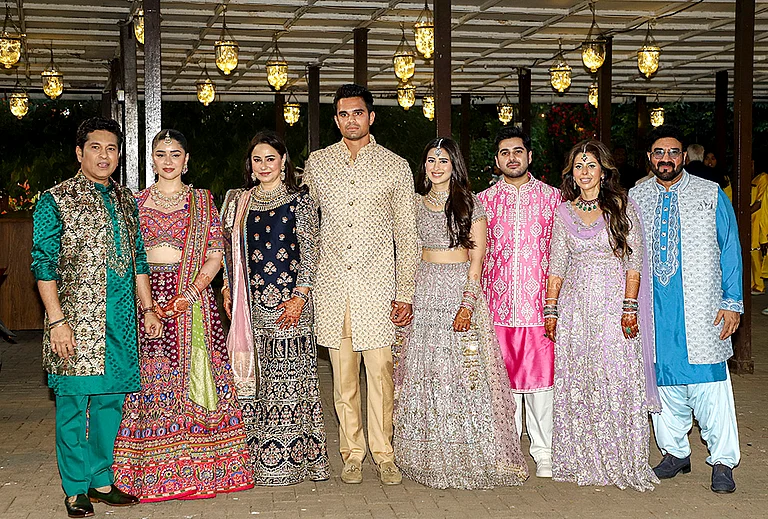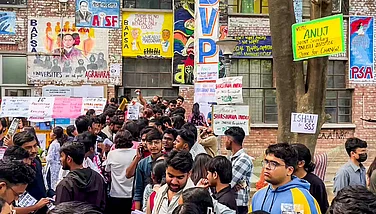Let's talk about sex, baby
Let's talk about you and me
Let's talk about all the good things
And the bad things that may be…
—Salt ‘N Peppa
The anthem from the 90s is one of the more memorable harbingers of the sexual revolution that gripped a generation of millennials. Being a sexually active individual over the last two decades in India has been a curious, exhilarating and even shameful experience. Growing up in a middle-class family in Mumbai who considered themselves to be liberal-minded when it came to matters of sexuality and relationships though, we didn’t talk about sex really.
My family gave me the standard “use protection” advice and sent me on my way. At no point were ‘all the good things and the bad things that may be’ ever brought up. I believe that was pretty much the norm for most of my generation, especially those that come from more modern, forward-thinking backgrounds. Sex was taboo and to think of it as a pleasurable, liberating and healing act was beyond the conception of our society.
As a queer adult in India, if there's one thing I've learned, it's that sex-positive relationships are the path to liberation amid a culture of sex-negativity, shame, and fear. Across India, rape culture, hegemonic masculinity, as well as erotophobia and sex-negativity contribute to the prevalence of inconsistent or ineffective education around consent and sexuality. As a community, queer folk have long been marginalised and misunderstood. However, it is the queer community that has been responsible for heralding the sexual revolution in India. Right from the Section 377 protests to Pride marches, the LGBTQIA+ community has reclaimed space and expression for misfitted individuals in a normatively oppressive society.
The advocacy of consensual non-monogamous relationship styles that counter monogamy and heteronormativity, are also inherently queer directives; ones which allow the fluidity of gender and sexual identity and help individuals to discover the meaning of love, pleasure and safety within the cocoon of a meaningful relationship.
Let's be real here; India has a complex history with sexuality. While our ancient texts embraced the nuances of sensuality, over time, external influences and colonial legacies ingrained a conservative approach to sexuality, resulting in deeply ingrained sex-negativity and shame. The sex-positivity of ancient India was manipulated by the colonial hangover and confusing nationalist ideas that have developed of late into limiting the sexual and social rights of women. This has had an adverse impact on queer individuals, making it even harder to celebrate identities and desires openly. However, one of the most powerful tools to have presented itself in the recent decade is an awareness and practice of kink. The term ‘kink’ here is synonymous with BDSM (i.e., bondage and domination/dominance and submission/sadism and masochism or sadomasochism) in reference to a vast multitude of activities that fall under the umbrella of BDSM, including but not limited to power exchange, the administration and receiving of pain, physical restriction and the incorporation of fetishism, voyeurism, exhibitionism and role-play scenarios.
Now, I know what you might be thinking. Kink in India? Isn't that a western thing? Well, yes, and no. While “non-vanilla” sexual engagement is as old as life itself, with cultures across the world engaging in non-traditional forms of sex, including India, sex that is not limited to just heteronormative penetrative sex and that involves a power dynamic has been part of our heritage, one that was quickly maligned by the colonial machinery for being hedonistic and immoral.
If one sees power as a central tenet to kink, it’s hard not to consider its importance and prevalence within any social coupling. Engaging in consensual kink allows people to explore their desires, challenge societal norms, and build trust with their partners. In a society that often invalidates our feelings and identities, kink offers a space where people can be unapologetically themselves.
BDSM and kink can allow survivors of sexual violence or abuse to reclaim their experiences and gain agency through safe, consensual, and pleasurable practice while role-play and other BDSM/kink practices can allow an individual to explore desires or boundaries safely. Consent, safe-words, and aftercare can provide a safe space, community, and outlet for processing events and physical trauma.
But it's not all about the ropes and blindfolds. The true essence of practicing kink lies in the communication and negotiation involved. Consent is at the core of it all. When you engage in kink, you must have open and honest conversations about your boundaries, limits, and desires. These skills aren't confined to the bedroom; they spill over into all aspects of the relationship, making them healthier and more fulfilling. And that’s where kink becomes culturally relevant. Queer or not.
For a society that outrages consent on an almost daily basis and one that pathologically treats sex as an imposition of male dominance and oppression, embracing kink deconstructs the harmful culture that has perpetuated sex-negativity for generations. It teaches us that our desires are valid and should be communicated without shame or fear. It empowers us to enthusiastically say ‘NO’ when we're uncomfortable and ‘YES’ when we're excited. Kink helps us dismantle the notion that sex is something to be hidden or ashamed of and instead encourages us to embrace our sexuality openly and unashamedly.
But the buck isn’t meant to stop at individual relationships; it's time to take this paradigm shift to the broader community. We need organisations that comprehensively address issues of consent and create safe spaces for everyone to explore their desires. It's time to have conversations around navigating personal boundaries and to prioritise pleasure as a fundamental aspect of human experience. There are a handful of organisations in the country such as The Intimacy Curator, Sangya Project and Agents of Ishq that are dedicatedly creating counter-narratives to the mono and heteronormative standards of sexual engagement in our country. Agents of Ishq even makes it a point to share their content in regional languages.
By creating awareness and a dialogue about pleasure and consent, the power to choose one’s own value systems for love and intimacy thrives. Organisations can also play a crucial role in facilitating workshops and discussions on consent and communication. These workshops aren't just for queer folks; they're for everyone.
By making these conversations inclusive, we promote understanding and empathy across different communities. After all, pleasure and consent are not confined to one sexual orientation or gender identity; they are human experiences.
Coming back to the family unit, I believe that it is essential to nurture cultural spaces in which adults and youngsters alike are able to have safe conversations with their peers and mentors. Even promoting sex-positive education in schools.
Let's face it; our sex education curriculum is outdated and inadequate. It's time to revamp it, and no, I don't mean just throwing in some biological jargon. We need comprehensive sex education that addresses consent, pleasure, and LGBTQIA+ issues. When we start educating young minds about these topics early on, we set the stage for a more inclusive and sex-positive society. Moreover, we need to destigmatise the act of seeking help and counselling related to sexual issues. No Allahabad High Court should be upset for “Youth Culture being full of Free Relationships with Opposite Sex.”
For me, growing up and coming into my queerness was a traumatic experience. I knew that I should be dating women, because I was perceived to be a man, but wanting anything else seemed shameful, often inviting jibes, comments and insults from many in my personal space. The discovery of consensual non-monogamy only came to me when I tried to justify to my female partner that I might have feelings for another man. It was then a long, arduous journey with much heartbreak and shame for me to find partnerships in which I was able to express my needs and desires, and in which I received respect and love for being the person I am.
So many individuals suffer in silence because they fear judgment and shame. The idea of this essay is to also encourage the creation of safe spaces where people can discuss their concerns openly and receive non-judgmental guidance.
Sex-positivity in public spaces has been a fascinating discovery, as I sit here in Berlin writing this article. I’m visiting this city that has a history of queer and sex-positive communities that live freely and openly, without the fear of shame and judgement from their neighbours, policemen and politicians. The club culture here in fact began as an effort to create safe spaces for queer people, with the bouncers in clubs curating and maintaining that sense of safety to-date. To consider that a government could consider making a club (Berghain) a cultural heritage is truly reassuring to know. It validates the idea of being different, alternative and non-normative not for the sake of being that way, but because all of us are deeply unique and exceptional in a very collected sort of way and that human sexual expression is not a shameful act, but is in fact very, very human. At the end of the day, it all comes down to recognising that sex is a natural, beautiful part of being human. By embracing sex-positivity, we celebrate our identities and allow others to do the same.
As a queer adult in India advocating for sex-positive relationships, I’ll double down on the idea that embracing kink and practicing consensual negotiation is a powerful way to deconstruct harmful cultures of sex-negativity, shame, and fear. By breaking free from societal taboos, we can create a more inclusive and understanding community. It's time for organisations and individuals alike to step up and foster a sex-positive culture, one that empowers everyone to embrace their desires, navigate boundaries, and prioritize pleasure in their relationships.
Pruthu Parab is a composer, sound engineer and educator
Pruthu Parab is a composer, sound engineer and educator

















